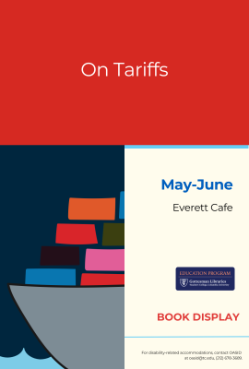New Book Display: On Tariffs
Everett Cafe
A tariff is a tax imposed on foreign-made goods, paid by the importing business to its home country’s government. Countries use them to protect domestic industry, including manufacturing, agriculture, and renewable energy; reduce trade deficits; provide government revenue; and stand against unfair or immoral trade practices, like drug and other forms of trafficking.
American presidents have used the power of tariffs since 1789, when the Tariff Act was signed by George Washington who added 5% tax to imported goods, many of them British. After World War II, tariffs fell largely into disfavor by advanced economies -- the United States and the United Kingdom among them -- because they were proven to reduce trade; raise prices for consumers; and cause retaliation by foreign countries.
The heavily sweeping tariffs recently imposed by the United States on countries throughout the world, and the dizzying escalation of retaliatory tariffs -- most especially by China --, have prompted concern for greater awareness; informed decision making; and mindful action. In a tumultuous time, and from a variety of perspectives, we explore the meaning, history, and debate on tariffs, known to drive trade policy and practices; affect the economy; and ultimately impact the livelihood and well-being of citizens.
At Everett Cafe, you'll find a new book collection every few weeks that relates to current events, education, or learning environments.

Poster Image: Boat Carrying Cargo, by Kai Oh, Library Associate

